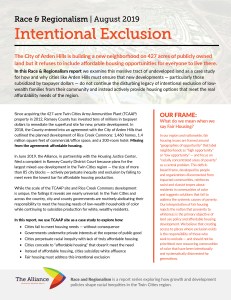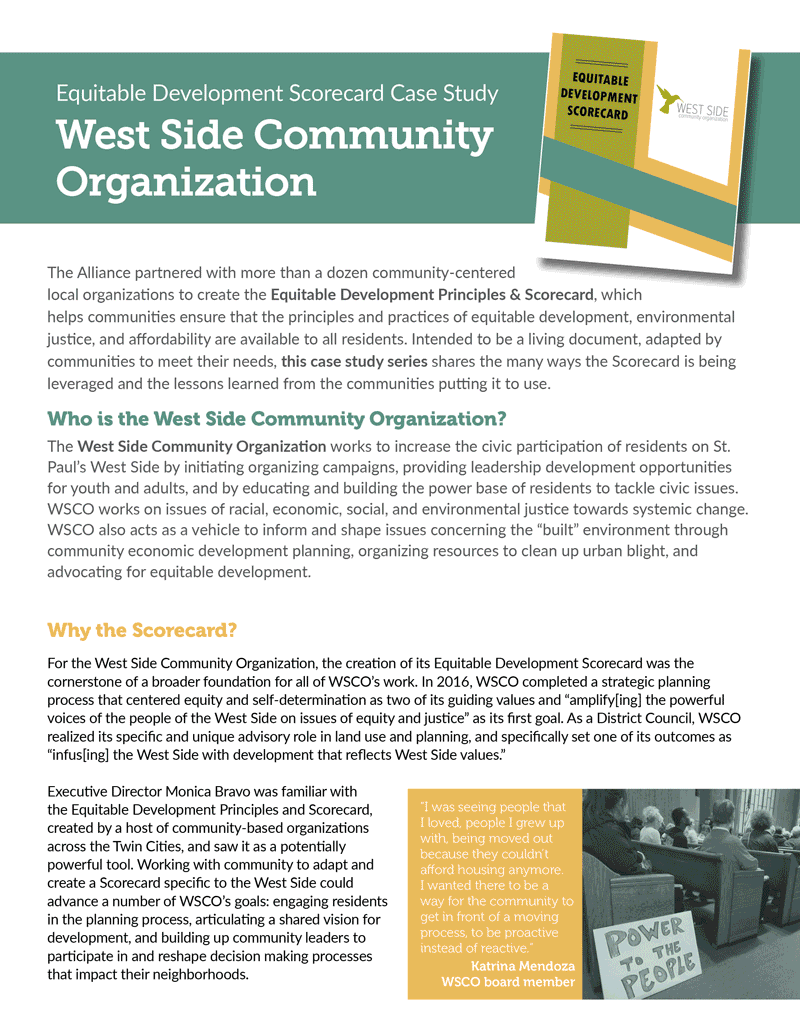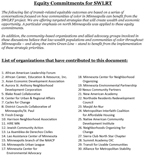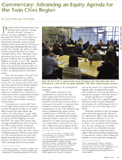Reports and Tools
Alliance Coalition Organizing Principles
2023
To advance our mission to build power across the intersections of geography, race, culture, and issues in the Twin Cities region to eliminate systems of oppression and advance our collective liberation, the Alliance convenes and works in coalition. Recognizing the role and impact of coalitions in major policy and organizing wins, we believe that no single organization has the capacity to create the level of systems and policy change necessary to deliver racial justice to our communities. We also know that collaboration among organizations requires great intentionality and resources. We do this work with the following principles.
Equitable Development Principles and Scorecard
2022
The Equitable Development Principles & Scorecard is a tool to answer the question: “How can development repair past harms and contribute to a stronger, more inclusive and thriving community?” Developed with community, it provides a framework to reclaim power and ensure that development is not an isolated project but rather becomes an integral piece of a collective commitment to create wealth, opportunity and stability for historically and systemically marginalized communities.
Equity in Place: 2022 State Policy Agenda
2022
During the 2022 state legislative session, leaders and lawmakers must be accountable to the thousands of households that are still experiencing the impact of the COVID pandemic and adopt new policy approaches to move beyond temporary measures to lasting systems change that delivers justice and equity for renters and our communities.
Blue Line Coalition: Our Lives Are On the Line Community Report
2022
Since 2013, the Blue Line Coalition has been working together to ensure government leaders recognize that the Blue Line extension is a racial justice and regional equity issue and that community inclusion and leadership must be central to ALL planning and outcomes. At a critical decision point around the route of the line, the BLC released a Community Report focused on authentic engagement and anti-displacement policies.
Equity in Place: From Emergency Protections to Equitable Solutions
2021
Our communities know that Minnesota renters faced a housing crisis long before the COVID pandemic — but the public health emergency underscored that policymakers have the power to safeguard the lives of renters when there is the political will. The eviction moratorium provided evidence that strong tenant protections are not just possible but beneficial to all residents — and another paradigm is possible. As emergency protections expire, we must adopt new narratives and policy approaches to move beyond temporary measures to lasting systems change that delivers justice and equity for renters.
Equity in Place Eviction Moratorium Off Ramp
2021
Thousands of renter households have been protected from displacement and empowered to organize under the COVID eviction moratorium. As the state moves toward lifting the moratorium, it is essential that the expiration is intentional in its timing, implementation and longer term impact.
Equity in Place 2021 Policy Addendum
2021
Given the increased severity of the housing crisis under COVID, Equity in Place recognized the critical role of state legislators and leaders in mitigating the harm in communities of color and shifting policy and resources to support renter and BIPOC households at a statewide level.
Our AREA 2021: Alliance Regional Equity Agenda
2021
Our AREA: The Alliance Regional Equity Agenda debuted in 2018 as a living document articulating shared strategies from member organizations and key stakeholders. Through our Actualizing Equity event series in 2020, we heard from leaders representing 34 organizations, capturing their input and expertise to evolve Our AREA with narratives and strategies for 2021 and beyond.
What is Equitable Housing?
2020
Affordable housing isn’t enough. For our communities to thrive, we need equitable housing. In 2019 and 2020, the Alliance co-led a project with Prabana Mendis, Graduate Research Assistant at the Center for Urban and Regional Affairs at the University of Minnesota, to work with community-based partners along the Green Line to articulate a vision for housing principles that keep community and culture rooted in the places they call home.
Case Study: WSCO Builds Community Power with Equitable Development Scorecard
2020
In a new case study, we take a deep dive into how WSCO worked with community members, city leaders and other stakeholders over the course of several years to adapt the Equitable Development Principles & Scorecard and co-create a powerful, proactive tool for West Siders to take back agency over who benefits from development and investment in their communities.
Why Does St. Paul Need Just Cause Notice?
2020
Just Cause Notice ordinances are an important policy tool to prevent displacement and promote tenant stability, especially in neighborhoods where rents are rising, vacancies are low, and landlords may seek to evict or non-renew existing tenants to upscale their buildings and attract wealthier renters at higher prices. These ordinances also protect tenants who assert their legal right to safe and healthy housing from retaliatory displacement, as well as protect them from discriminatory or arbitrary terminations that too many renters of color still face.

Barriers to Fair Housing in the Twin Cities
2020
In 2018 and 2019, community-based organizations that are members of Equity in Place received funding from the Fair Housing Implementation Council and the Heading Home Minnesota Funders Collaborative to conduct community engagement around fair housing issues in local communities.

5 Pillars of Affordable Housing Policy
2020
Equity in Place is a diverse group of strategic partners from organizations led by people of color and housing advocacy organizations working to advance housing justice and equitable community development. We believe that housing policy must be informed by five key pillars (5 Ps) that center our communities and move toward transformative systemic change.

Equity in Place Policy Agenda
2020
Informed by communities most impacted by housing injustice and instability, Equity in Place identified four areas for housing policy change, including housing access, housing stability, community ownership and community investment. In our Policy Agenda, we outline the specific policy solutions we recommend, including the impact and citing examples and resources for each.

Race & Regionalism: Intentional Exclusion
2019
In this Race & Regionalism report we examine this massive tract of undeveloped land as a case study for how and why cities like Arden Hills must ensure that new developments — particularly those subsidized by taxpayer dollars — do not continue the disturbing legacy of intentional exclusion of low-wealth families from their communities and instead actively provide housing options that meet the real affordability needs of the region.

Our AREA: Alliance Regional Equity Agenda
2018
Our AREA: Alliance Regional Equity Agenda is a strategic document centered around the needs and aspirations of people of color, indigenous, immigrant, and low-income communities. It highlights the strategies Alliance members and partners are using and calls for further collective action to heal communities, stimulate regenerative power, dismantle structural racism, and end the displacement and gentrification of our communities.
Equitable Development Principles & Scorecard
The Alliance partnered with the Harrison Neighborhood Association, Umoja Community Development Corporation, and members of the Community Engagement Steering Committee to create the Equitable Development Principles & Scorecard, which helps communities ensure that the principles and practices of equitable development, environmental justice, and affordability are available to all residents. We are now working with local communities of color and low-income communities to pilot the tool to advance equitable development in the region. A Scorecard Enthusiasts group has come together to provide resources that make the Scorecard more accessible.
Actualizing Equity Series
The 2018 Actualizing Equity Series dives into each section covered by Our AREA: the Alliance Regional Equity Agenda. Local leaders join us in exploring and discussing the ways each issue area intersects with the complex identities and historical struggles of our communities.
Each session includes a panel with local leaders followed by breakout discussions. We create resource documents based on ideas generated in these conversations.
Development Comparison: Ford & TCAAP
8/8/18
The former sites of the Ford Auto Plant in Saint Paul and the Twin Cities Army Ammunition Plant in Arden Hills are currently being redeveloped. These huge parcels of land offer some of the region’s most significant opportunities to generate desperately needed affordable homes on a large scale. This side-by-side compares the scale, density, and projected affordability of each site.
Transformative Equitable Development for Healthy Communities
This series gives space for community leaders and practitioners to share their experience and intentionally strategize on the ways in which we can anchor community-led, transformative equitable development in our region. The series highlights the existing assets in communities as well as the opportunities to build stronger together in our future. Through this work, we are demonstrating how transformative equitable development can create better outcomes for low-wealth communities and communities of color.
Better Bus Stops Community Engagement Report
05/01/2017
In 2016, the Community Engagement Team (comprised of the Alliance, Nexus Community Partners, and the Center for Urban and Regional Affairs) partnered with Metro Transit to provide engagement expertise for the Better Bus Stops campaign. The CET awarded contracts to 11 local organizations to engage transit riders and historically underrepresented communities around transit equity issues with a focus on bus stops. This report describes the community engagement tools that were utilized and shares lessons learned from the experience.
The 3 Pillars of Affordable Housing Advocacy (3 Ps: Protection, Production, Preservation
4/20/2017
This tool presents a platform of affordable housing advocacy policies based on the 3 Ps: tenant protection, production of new affordable homes, and preservation of current affordable housing. The strategies included are adapted from a 8/17/16 memo from the Housing Justice Center.
The Equitable Development Scorecard
09/08/2016
The Scorecard was created by Twin Cities, MN community leaders to make sure that the principles and practices of equitable development, environmental justice, and affordability are available to all communities as they plan for economic development and wealth creation that benefits everyone.
Moving Minnesota from Worst to First in Employing People of Color
09/08/2016
HIRE Minnesota is excited to announce that the Vikings stadium construction contractors exceeded their hiring goal of 32 percent people of color, totaling more than 1.3 million hours worked. This translates to $39 million in estimated wages for construction workers alone. HIRE Minnesota was instrumental to this effort, with transparent policies, innovative solutions, and oversight of the hiring process.
Equitable Transportation Investments for All Minnesotans
02/02/2015
Investing in a comprehensive transportation system, including public transit, roads and bridges, and bicycle and pedestrian infrastructure, will create greater access to jobs and opportunities for all Minnesotans. These investments make our state more economically competitive and position Minnesota to thrive in an increasingly global economy. To maintain our competitive advantage, build up our under-utilized local assets, and generate entrepreneurial activity, Minnesota needs to step up and make the kind of game-changing investments that will lead to long-term, shared prosperity.
Equity Commitments for Southwest Light Rail Transit
05/23/2014
The Equity Commitments for the Southwest LRT coalition created these recommendations for transit-related equitable outcomes focused on how communities of color in Minneapolis can benefit from the SWLRT project. We focused on targeted strategies that will create wealth and economic opportunity, with a particular emphasis on north Minneapolis. Also see the Equity Commitments for the SWLRT Matrix.
Advancing an Equity Agenda for the Twin Cities Region
05/31/2013
A CURA Reporter commentary by Neeraj Mehta and Tracy Babler explores how using an equity framework will provide people of color with access to opportunities such as housing, jobs, and education, thereby closing the racial gap that pervades the Twin Cities region.
Hiring Equity: Can MnDOT End 20 Years of Failure to Meet Hiring Goals for People of Color
04/03/2013
The Alliance for Metropolitan Stability is excited to release the most recent paper in our Race and Regionalism series – “Hiring Equity: Can MnDOT End 20 years of Failure to Meet Hiring Goals for People of Color?” This paper addresses the institutional and cultural changes that will be necessary to end employment disparities in the Twin Cities region.
The Alliance’s Race and Regionalism series explores a history of public policymaking that favored, either intentionally or as a byproduct of poor decision-making, the needs of white people over those of people of color and indigenous people. An examination of these policies demonstrates how racial discrimination has shaped and defined our region.
Sustainable Communities in the Twin Cities: How Community Groups Are Working with Government to Transform Transitway Development
03/14/2013
This document outlines key learning points from the Community Engagement Team of the Corridors of Opportunity initiative. This HUD-funded initiative brought regional partners together from the public, private and nonprofit sectors to use transitway development as an economic catalyst for the region. The Alliance, the Minnesota Center for Neighborhood Organizing and Nexus Community Partners ran the Community Engagement Team.
Corporate Subsidies: How Economic Development Policies Contribute to Racial Disparities
08/15/2012
The Alliance for Metropolitan Stability released a series of Race and Regionalism papers that explored a history of public policymaking that favored, either intentionally or as a byproduct of poor decision-making, the needs of white people over those of people of color and indigenous people in the Twin Cities region. This paper shows how corporate subsidies and economic policies, justified in the name of spurring job creation, have contributed to racial disparities. It also discusses how designing our economic policies with race in mind can provide a double bottom line by simultaneously catalyzing job growth and closing the employment gap.
Twin Cities 2050: Advancing an Equity Agenda for the Twin Cities region
08/09/2012
Check out this recap of the Twin Cities 2050 roundtable, where community, government and business leaders from the Twin Cities region came together to discuss the largely untapped potential living within our region’s communities of color and how it can be better utilized to fuel our region’s economic growth.
How A Stadium Equity Plan Was Created: The Inside Story
05/31/2012
As the debate over public funding for the Minnesota Vikings stadium unfolded in 2012, HIRE Minnesota noticed that there was a lot of talk about job creation, but no talk about who would get those jobs. We set out to change that. This document explains how HIRE Minnesota secured the nation’s first over stadium equity plan to secure jobs for people of color.
The Harrison Neighborhood: How a Community Becomes Marginalized
04/30/2012
The Alliance for Metropolitan Stability released a series of Race and Regionalism papers that explored a history of public policymaking that favored, either intentionally or as a byproduct of poor decision-making, the needs of white people over those of people of color and indigenous people. This paper shows how a series of policy decisions created systemic barriers to opportunity for people of color in the Harrison neighborhood of North Minneapolis.
The G.I. Bill: America’s Largest Affirmative Action Program
03/07/2012
The Alliance for Metropolitan Stability shared a series of stories that explored a history of public policymaking that favored, either intentionally or as a byproduct of poor decision making, the needs of white people over those of people of color and indigenous people. This first paper looks at the long-term effects of the post-WWII G.I. Bill and demonstrates how even race-neutral policies, when poorly planned or implemented, can have drastic and persistent negative effects on people of color.
Stops for Us: Organizing for Equity Along the Central Corridor
12/12/2011
The Alliance was a member of the Stops for Us coaltion, which won a major victory to secure three missing stations on the Central Corridor LRT line (now called the Green Line). This story details the organizing win and the lessons learned from coalition members.
Twin Cities Regional Transitway Decision-Making Overview
10/11/2011
Who has authority over transitway planning in the Twin Cities? This flow chart depicts the complex and often interrelated authorities who play a role in transitway planning in our region.
Community Engagement Opportunities for Transitway Development
10/11/2011
How does a new transitway get planned? The complex steps of planning, design and public input can be overwhelming. This simple chart shows the major planning steps each new transitway must go through, and which government agencies have authority over those processes.
Twin Cities Sustainable Communities Grant Community Engagement Team Presentation
11/30/2010
The Twin Cities region was recently awarded a grant from the HUD Sustainable Communities Regional Planning Grant program.
The Alliance, Nexus Community Partners and the Minnesota Center for Neighborhood Organizing were selected to lead a Community Engagement Team to to ensure communities along emerging transitways have a voice and a strong role in planning for the future of their neighborhoods.
This presentation provides background on the initiative and early planning for the grant’s community engagement efforts.
Transportation Stimulus in Minnesota: Increasing Equity or Exacerbating Disparities?
01/20/2010
When it passed in February 2009, the American Recovery and Reinvestment Act (ARRA) was a beacon of hope for many low-income communities and communities of color. An important guiding principle for ARRA states that funds should be used to assist those most impacted by the recession. Communities of color, which have historically borne the greatest unemployment burden, saw the stimulus bill as an opportunity to challenge the status quo in how public investments are allocated to communities around our nation. In this paper, we examine how stimulus funds were spent on transportation infrastructure investments in Minnesota. Did people of color receive their fair share of transportation stimulus funding? Or did our state fall short in meeting the recovery act’s goal to benefit the people most impacted by the recession?
Evaluating Our Transportation Future: How Federal Spending Influences Local Transportation Planning and What Communities Can Do About It
01/20/2010
Right now is a critical moment for local communities to understand how federal transit project evaluation criteria affect decisions that will happen right in our own backyards. With so many communities in Minnesota affected by these decisions, it is important for people to understand our existing system and speak up for changes that will provide more equitable transportation spending in years to come.
15 years Organizing Together for Justice
11/19/2009
The Alliance celebrated our 15th anniversary in 2009. Read about our accomplishments in our first 15 years and check out the winning photographs in our in/stability photo competition.
The Benefits of Public Transportation
09/02/2009
Transportation is the lifeblood of a nation’s economy, moving and connecting people, goods and services. For many Americans, talk of our transportation system may bring to mind our expansive highway system, undoubtedly the largest in the world. But increasingly, studies are showing that Americans want alternatives to driving to their destinations.Public transportation can answer that call, and can play a significant role in solving a number of other challenges facing our nation today.
Transportation Stimulus in Minnesota
06/29/2009
Did Minnesota use the federal stimulus to create jobs, catch up on needed repair, and expand transportation choices for everyone? This report produced by the Alliance for Metropolitan Stability, Transit for Livable Communities and 1,000 Friends of Minnesota analyzes transportation stimulus spending in Minnesota.
Recommendations for the Wireless Minneapolis Community Benefits Agreement
03/06/2006
The Digital Inclusion Coalition was hosted by the Alliance for Metropolitan Stability and comprised of organizations and individuals concerned about creating opportunities for low-income people and people of color to gain access to and training on computers and the Internet. The group came together as the city of Minneapolis issued an RFP for a private company to run its citywide Wi-Fi network. The coalition released Recommendations for the Wireless Minneapolis Community Benefits Agreement, which advocated for the city to demand benefits for taxpayers in the vendor contract. Providing solutions to the digital divide, the report shows how to ensure that all are represented when a city offers universal wireless internet service. Many of these recommendations were adopted in the final contract between the city and US Internet, providing more than $11 million for digital inclusion efforts in Minneapolis and many other benefits.
Community Benefits Agreements: Growing a Moment in Minnesota
01/28/2008
The Alliance for Metropolitan Stability released this report on community benefits agreements to further develop local understanding of the CBA’s potential to yield significant, community-desired results from large-scale redevelopments and other projects. More and more organizations and coalitions are turning to the CBA model to produce meaningful—and, perhaps more importantly, enforceable—outcomes for low-income people and communities of color.









































You must be logged in to post a comment.